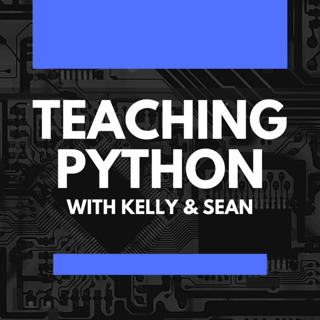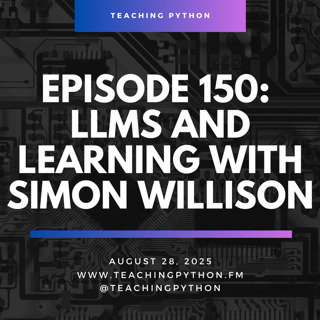
Episode 150: LLMs with Simon WIllison
In this milestone 150th episode, hosts Kelly Schuster-Paredes and Sean Tibor sit down with Simon Willison, co-creator of Django and creator of Datasette and LLM tools, for an in-depth conversation about artificial intelligence in Python education. The discussion covers the current landscape of LLMs in coding education, from the benefits of faster iteration cycles to the risks of students losing that crucial "aha moment" when they solve problems independently. Simon shares insights on prompt injection vulnerabilities, the importance of local models for privacy, and why he believes LLMs are much harder to use effectively than most people realize. Key topics include: Educational Strategy: When to introduce AI tools vs. building foundational skills first Security Concerns: Prompt injection attacks and their implications for educational tools Student Engagement: Maintaining motivation and problem-solving skills in an AI world Practical Applications: Using LLMs for code review, debugging, and rapid prototyping Privacy Issues: Understanding data collection and training practices of major AI companies Local Models: Running AI tools privately on personal devices The "Jagged Frontier": Why LLMs excel at some tasks while failing at others Simon brings 20 years of Django experience and deep expertise in both web development and AI tooling to discuss how educators can thoughtfully integrate these powerful but unpredictable tools into their classrooms. The conversation balances excitement about AI's potential with realistic assessments of its limitations and risks. Whether you're a coding educator trying to navigate the AI revolution or a developer interested in the intersection of education and technology, this episode provides practical insights for working with LLMs responsibly and effectively. Resources mentioned: - Simon's blog: simonwillison.net - Mission Encodable curriculum - Datasette and LLM tools - GitHub Codespaces for safe AI experimentation Special Guest: Simon Willison.
28 Elo 1h 36min
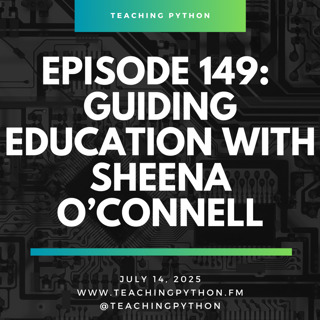
Episode 149: Guiding Education with Sheena O'Connell
Description In this episode, we're thrilled to welcome Sheena O'Connell, an educator and developer from South Africa who has been making waves in the Python education community. Sheena shares her journey from electrical engineering to founding Prelude, where she runs advanced Django learning sprints and teamwork training courses. We explore the critical importance of soft skills in technical education, diving into Google's Project Aristotle and the five key factors that make teams effective: psychological safety, dependability, structure and clarity, meaning, and impact. Sheena provides fascinating insights into how cultural concepts like Ubuntu ("I am because we are") influence collaborative learning and professional development. The conversation covers practical strategies for teaching both technical and soft skills to adult learners, the challenges of helping students transition from learning to professional environments, and how to build psychologically safe spaces that promote growth and learning. We also discuss upcoming events including Django Con Africa in Tanzania and PyCon Africa in Johannesburg, South Africa, which Sheena is chairing. Whether you're an educator, team leader, or developer interested in fostering better collaborative environments, this episode offers valuable insights into the intersection of technical education, cultural awareness, and team dynamics. Key Topics Discussed Transitioning from technical roles to education Building effective coding bootcamps and adult learning programs The importance of soft skills in technical careers Google's Project Aristotle and team effectiveness Psychological safety and stereotype threat Cultural influences on learning and teamwork (Ubuntu philosophy) Managing the "desperation mindset" in learning environments Professional development and career transitions PyCon Africa and Django Con Africa Cross-cultural team dynamics and communication Guests Sheena O'Connell - Founder of Prelude, former educator at Umuzi, and chair of PyCon Africa 2025 Resources Mentioned Google's Project Aristotle (https://rework.withgoogle.com/en/guides/understanding-team-effectiveness) The Culture Map (book on cultural differences in teams) Prelude Tech (https://prelude.tech) - Sheena's platform for Django courses and teamwork training PyCon Africa 2025 (Johannesburg, South Africa) Django Con Africa (Arusha, Tanzania) Ubuntu philosophy Umuzi (South African coding bootcamp) Connect with Sheena Personal blog: sheenaoc.com (https://sheenaoc.com) Courses and training: Prelude TV PyCon Africa 2025: October, Johannesburg, South Africa Wins and Fails of the Week Sheena Win: Successfully running a teamwork course for Canonical with an international team Fail: All her plants fell onto the couch (and the subsequent cleanup) Kelly Win: Attending ISTE conference in San Antonio, meeting previous podcast guests, and co-hosting a presentation Fail: Losing momentum on Anthony Shaw's GitHub course due to summer break Sean Win: Being interviewed by media about AI coding tools and AWS Amazon Q Fail: Home server power supply failure during a lightning storm, breaking all home automations Episode Notes This episode provides valuable insights for educators at all levels, from K-12 teachers to corporate trainers. The discussion of soft skills, cultural awareness, and team dynamics offers practical strategies that can be applied in classrooms, coding bootcamps, and professional development settings. The conversation highlights how technical education must go beyond coding skills to prepare students for successful careers, emphasizing the importance of communication, collaboration, and cultural competency in today's global technology landscape. Special Guest: Sheena O'Connell.
15 Heinä 47min
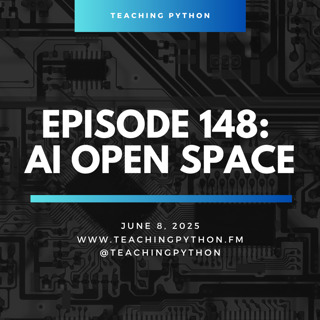
Episode 148: PyCon 2025 AI Education Open Space
In this special episode of Teaching Python, hosts Sean Tibor and Kelly Schuster-Paredes convene an open space discussion at PyCon US 2025 in Pittsburgh. Surrounded by a diverse group of educators, developers, and learners, they hand the mic to the community to answer two key questions: How are you using AI personally, and how do you see AI shaping education? Listeners will hear firsthand accounts from university lecturers, high school teachers, industry professionals, and volunteer mentors. Topics include the impact of AI tools on coding productivity, the challenges of assessing genuine learning in an AI-rich environment, and strategies for teaching critical thinking alongside technical skills. The episode also delves into the tension between embracing AI as an educational aid and ensuring students develop foundational problem-solving abilities. Whether you’re an educator, developer, or simply curious about the future of learning, this episode offers a nuanced, multi-perspective look at AI’s growing influence in the classroom and beyond.
8 Kesä 57min
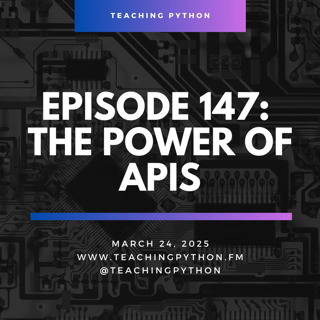
Episode 147: The Power of Teaching APIs
In Episode 147 of Teaching Python, Sean Tibor and Kelly Schuster-Paredes focus on the importance and power of teaching APIs to coding students. They share personal stories and practical strategies for engaging students with APIs, from simple use cases to more complex projects. Join them as they discuss how to make lessons fun and relevant, leveraging LLMs (Large Language Models) for code explanations, and teaching through trial and error. This episode also touches on the broader applications of APIs in today's technological landscape, examining how learning APIs can open up new possibilities for students and equip them with essential skills for the future. Whether you're a teacher, student, or coding enthusiast, there's something valuable in this episode for you.
24 Maalis 40min
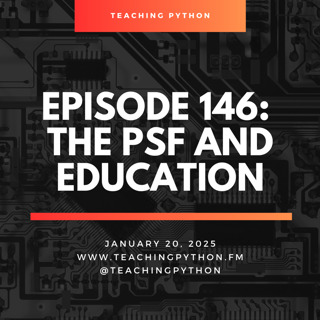
Episode 146: PSF Education Outreach Workgroup and the Education Summit
In episode 146 of Teaching Python, hosts Sean Tibor and Kelly Schuster Perez delve into the newly established Python Education and Outreach Work Group, featuring guests Cheuk Ting Ho and Keith Murray. The group, aimed at enhancing Python education within the community, outlines its mission to gather feedback on educational resources and support initiatives like the Education Summit at PyCon US. Keith and Cheuk discuss their backgrounds and roles within the Python Software Foundation, emphasizing the need for fresh educational content and community engagement. The episode also explores the work group's goals, which include: Seeking and receiving feedback on Python educational resources Consolidating and improving existing Python education materials Supporting and expanding the education summit at PyCon US Additionally, the hosts share personal 'wins of the week,' highlighting the importance of accountability and community in the educational journey. Kelly and Sean discuss their past experiences with the Education Summit and encourage listeners to get involved by submitting talk proposals or joining in interactive sessions. The episode concludes with practical advice on how educators and enthusiasts can engage with the group to further Python education and outreach. Special Guests: Cheuk Ting Ho and Keith Murray.
21 Tammi 52min
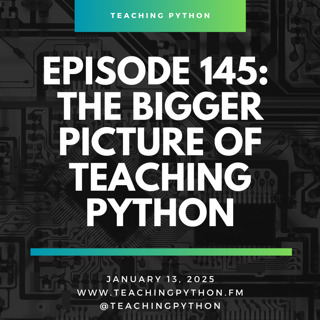
Episode 145: The Bigger Picture of Teaching Python
In episode 145 of Teaching Python, Sean Tibor and Kelly Schuster-Paredes celebrate their six-year podcast anniversary and discuss the shifts within computer science education and the growing influence of AI. They both reflect on the podcast’s journey, their experiences with Blue Sky, and the milestone of over 500,000 downloads. The conversation delves into the changing landscape of tech roles, emphasizing the importance of foundational coding skills and computational thinking, regardless of emerging technologies like AI. They underline how coding remains a key skill that enables personal growth and opens vast opportunities, even in the face of fast-evolving tech sectors. Our hosts also highlight their exciting upcoming engagements, including the FETC conference and the Pine Crest Innovation Institute, encouraging listeners to remain adaptable and open to new learning avenues. Furthermore, they discuss the concept of adapting computer science curriculums to reflect real-world applications and evolving job markets, focusing on how to better prepare students for future careers. With a mix of personal anecdotes and professional insights, this episode offers a heartfelt look at the impact of teaching coding and the continuous evolution in education and technology.
13 Tammi 1h 2min
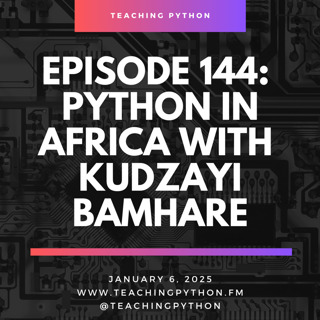
Episode 144: Python in Africa with Kudzayi Bamhare
In episode 144 of Teaching Python, hosts Sean Tibor and Kelly Schuster-Paredes are joined by special guest Kudzayi Bamhare from Zimbabwe. They dive into the important topic of Python education as a driver of innovation in Africa, focusing specifically on the challenges and opportunities in Zimbabwe. The conversation covers how coding communities are forming and thriving despite various hurdles, and how inclusive environments can foster learning and growth in the tech industry. Kudzayi shares his inspiring journey into the world of coding, beginning with his initial exposure to Python and how attending Python conferences like PyCon Namibia have been pivotal in his growth. He emphasizes the importance of community, collaboration, and support in helping budding coders overcome challenges and stay motivated. The discussion also highlights the need for more initiatives and workshops to bridge the gap in tech education across the continent. The episode concludes with insightful ideas on how to create effective learning environments and the role of educators in nurturing future tech talents. Sean and Kelly, alongside Kudzayi, discuss the significance of making coding accessible and engaging, especially in underrepresented regions. They call on listeners to support initiatives that bring Python education to Africa, encouraging a global collaboration to drive technological progress and innovation. Special Guest: Kudzayi Bamhare.
6 Tammi 53min
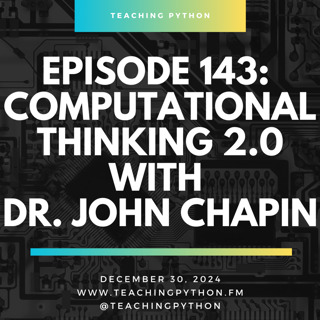
Episode 143: Computational Thinking 2.0 with Dr. John Chapin
In Episode 143 of Teaching Python, hosts Sean Tibor and Kelly Schuster-Paredes engage in a compelling conversation with Dr. John Chapin, a renowned computer science educator and presenter at CSTA. As the CS Pathway Leader at the Academies of Loudoun, Dr. Chapin brings over a decade of experience in primary and secondary education, creating and implementing rigorous curricula for post-AP CS students. He shares insights into the transformative power of Computational Thinking 2.0, emphasizing the importance of Python and data science in today's educational landscape. Listeners will gain a deeper understanding of how integrating machine learning, data analytics, and mobile app development into CS education can foster a culture of inquiry, creativity, and collaboration among students and educators. Throughout the episode, Dr. Chapin discusses his recent research on the impact of whiteboarding on student self-efficacy in CS1 classes, as presented at the Association for Computing Machinery's Global Computer Education Conference (CompEd2023). He also shares his experiences conducting professional development workshops for CS teachers across Virginia and his efforts to align CS programs with the evolving needs of the workforce and society. This episode is a must-listen for educators, administrators, and anyone passionate about the future of computer science education, offering actionable ideas and inspiration to enhance their teaching practices and curriculum design. Special Guest: Dr. John Chapin.
30 Joulu 202455min
